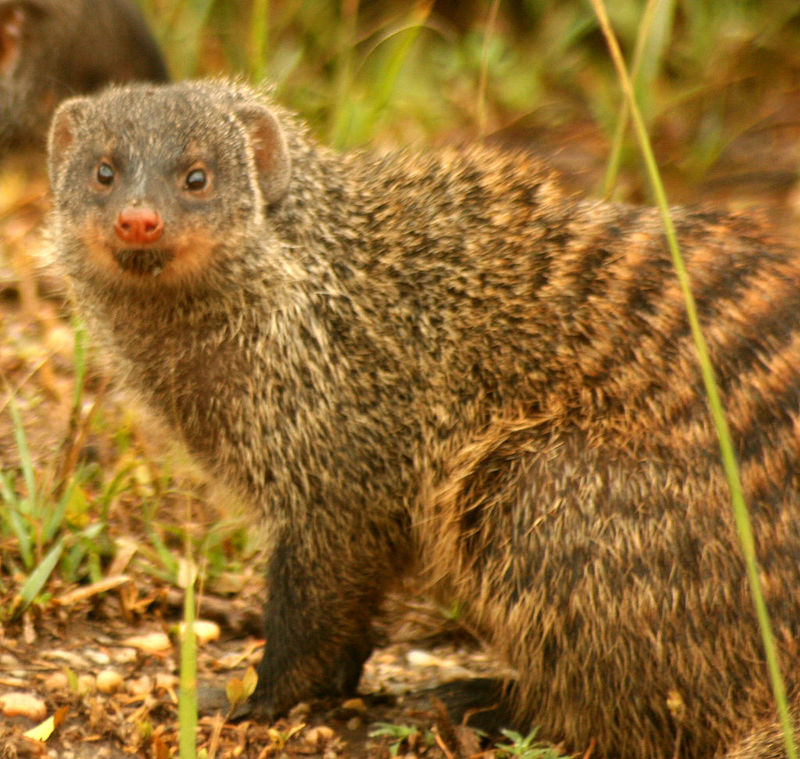|
| Query: common zebra | Result: 144th of 145 | |
Banded Mongoose (Mungos mungo) - Wiki
| Subject: | Banded Mongoose (Mungos mungo) - Wiki
| |

| Resolution: 1024x972
File Size: 233058 Bytes
Upload Date: 2007:08:14 13:38:05
|
Banded Mongoose
From Wikipedia, the free encyclopedia
[Photo] Mungos mungo (Zebra mongoose) in Uganda. Author: TKnoxB http://www.flickr.com/people/tkb/ Source: http://www.flickr.com/photos/tkb/17063789/
The banded mongoose (Mungos mungo) is a mongoose commonly found in the central and eastern parts of Africa.
Physical characteristics
The banded mongoose is a sturdy mongoose with a large head, small ears, short, muscular limbs and a long tail, almost as long as the rest of the body. Animals of wetter areas are larger and darker colored than animals of dryer regions. The abdominal part of the body is higher and rounder than the breast area. The rough fur is grayish brown, and there are several dark brown to black vertical bars across the back. The limbs and snout are darker, while the underparts are lighter than the rest of the body. Banded mongooses have long strong claws that allow them to dig in the soil.
An adult animal can reach a length of 30 to 45 cm and a weight of 1.5 to 2.25 kg. The tail is 15 to 30 cm long.
Distribution and habitat
The banded mongoose lives in open savannas, open forests and grassland, especially near water, but also in dry, thorny bushland. The species is common in areas with many termite mounds, that serve as housing and food (see below). The banded mongoose is found in a large part of East, Southeast and South-Central Africa. There are also populations in the northern savannas of West Africa.
The development of agriculture in the continent has had a positive influence on the number of banded mongooses. The crops of the farmland serve as an extra food source.
Behavior
The banded mongoose is a diurnal animal, but on hot days it is only active during the morning and evening. It is a gregarious species that roams in family groups of about 30 animals. When a group contains more than 40 animals, it will usually split into two smaller groups of 15 to 20 individuals. Members of a group can recognize their companions by a distinctive group scent.
The core of a group consists of one dominant male and three or four dominant females (but in groups in Uganda the number can be as high as 10). Banded mongooses have a low reproductive skew in which reproduction is more evenly distributed among individuals who can breed (Cant 1999; Gilchrist 2004, 2006; DeLuca and Ginsberg 1999). The hierarchy among the members of the group is based on age, size, and assertiveness. After a gestation period of two months, four young are born. They are breastfed by all milk-producing females of the group. Adult animals often play with the young.
Banded mongoose have a close relationship with baboons and are often found in their company. They forage together and probably enjoy greater security as a large group because of more eyes on the lookout for predators. The mongoose are handled by baboons of all ages and show no fear of such contact.
Food
The diet of the banded mongoose consists mainly of invertebrates, including insects (termites and larvae of beetles), centipedes, lizards, snakes, frogs and sometimes mice. They dig up most of the food with their strong claws. Sometimes they also eat roots and fruit. One of their favorite snacks is a bird's egg.
Banded mongooses search for food in small, loose groups. To stay in contact, they use a wide variety of sounds.
http://en.wikipedia.org/wiki/Banded_Mongoose
| The text in this page is based on the copyrighted Wikipedia article shown in above URL. It is used under the GNU Free Documentation License. You may redistribute it, verbatim or modified, providing that you comply with the terms of the GFDL. |
|
Comments |
|---|
| | Guest |
|
Scientific Name: Mungos mungo (Gmelin, 1788)
Common Names:
English – Banded Mongoose
French – Mangue rayée
Synonyms: Viverra mungo Gmelin, 1788 |
^o^
Animal Pictures Archive for smart phones
^o^
|
|
|